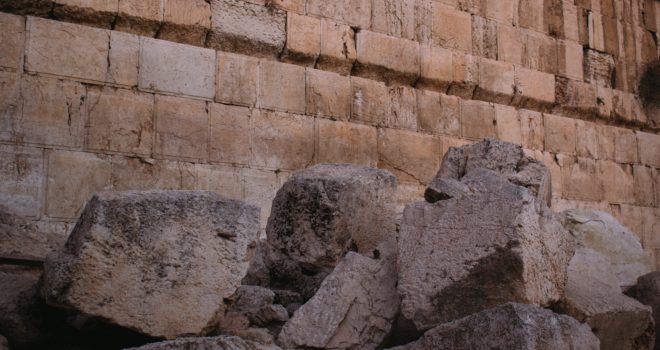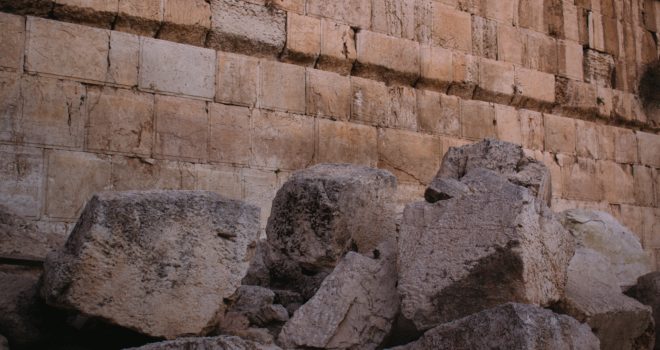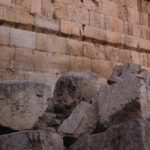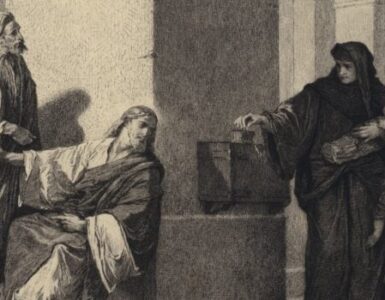Readings for the Thirty-third Sunday in Ordinary Time
Jesus once overheard a conversation about the glory of the Temple in Jerusalem. He then made a startling prediction. What was it?
Gospel (Read Lk 21:5-19)
St. Luke tells us Jesus had a conversation with His disciples about the Temple in Jerusalem. It began when “some people were speaking about how the Temple was adorned with costly stones and votive offerings.” To the Jews of Jesus’ day, the Temple was the signature symbol of their long covenant with God as His people. It was the place on earth where God and man literally met, an encounter that took place once a year in its inner chamber, the Holy of Holies. On the Day of Atonement, the high priest would enter and make a sacrifice for the sins of the people, and God’s glory would come down and overshadow the “mercy seat” on the Ark of the Covenant as He accepted the offering and granted forgiveness (see Lev 16). Over Israel’s long history, the Temple began to be revered as a sign that nothing would ever change God’s relationship with His people. If God dwelt in their midst, how could they be anything but safe?
If we know this, we will understand how disturbing it must have been for anyone to hear Jesus’ startling prophecy: “The days will come when there will not be a stone left upon another stone that will not be thrown down.” Naturally, this provoked questions: “When will this happen? And what sign will there be when all these things are about to happen?” We might have our own question: Why would God allow the sacred symbol of the Temple to be destroyed?
In Jesus’ day, the Temple had actually become an empty symbol. There was little rigor in the religion of the Jews; it had become largely externalized (remember Jesus’ cleansing of the Temple because it was meant to be a “house of prayer”). In addition, the Temple sacrifices were never meant to be ends in themselves. How could animal blood ultimately atone for human sin? The Temple, with its beauty and sacred action, pointed toward something beyond itself. When Jesus came in to the world, He came to be the human fulfillment of the animal sacrifices. Innocent human blood would atone for human sin in the New Covenant He made with us. By His Death and Resurrection, He became the new Living Temple of God, where God and man—all people, not just the Jewish high priest—meet. Believers, as St. Peter tells us, are now being built as living stones in this spiritual Temple, the Mystical Body of Christ (see 1 Pet 2:5). The Temple in Jerusalem was no longer necessary; it had served its purpose.
Yet why did the Temple have to be “thrown down”? Why not just keep it as a relic of sacred architectural history for the Jews and the whole world? To answer this question, Jesus describes a time of terrible turmoil. We know that He was predicting a coming judgment on Jerusalem—God’s just judgment on its rejection of Jesus as their Messiah. Within just one generation of this statement, about forty years, the Romans entered the city and sacked it (70 A.D.). Nothing was left of the Temple except a portion of one wall (the Wailing Wall, still standing today). Jesus’ words were literally fulfilled. The sack of the city was preceded by three years of terrible mayhem within its walls. Many insurrectionists claimed to be the Messiah sent from God to deliver Judah militarily from Rome. Factions formed and warred against each other. A devastating famine grew so severe that animal sacrifices in the Temple came to an end because there were no more animals. When the Romans finally did enter the city, there was a blood bath. It was horrific. The Temple had to come down not because it was outdated but because it had become a symbol of the disobedience of God’s people.
However, we see Jesus told His disciples that “before all this happens” they would undergo their own upheaval because of persecution: “They will hand you over to the synagogues and to prisons, and they will have you led before kings and governors because of My Name.” He also warned them that their fidelity to Him could cost them relationships with family and friends. Some would know betrayal and even death. Remarkably, Jesus told the disciples not to prepare their defense beforehand, because “I Myself shall give you a wisdom in speaking that all your adversaries will be powerless to resist or refute” (see Acts 6:9-10, the martyrdom of St. Stephen, as an example of this promise’s fulfillment). In the coming time of trial for the disciples, perseverance would be necessary: “By your perseverance you will secure your lives.”
We know whenever Jesus spoke in the Gospels about the destruction of the Temple and the coming judgment on Judah’s covenant unfaithfulness, He was also foreshadowing God’s Final Judgment on the whole world at the end of time. The Jews believed the Temple to be an architectural microcosm of the universe—a kind of replica of heaven meeting earth, of God and man together. If the Temple was destined to come to an end because of disobedience, so is this world. So, although most of what Jesus said about the Temple and the fate of Jerusalem was meant for people living in His day, the words and images reach far into the future, too.
What did Jesus want His disciples to be doing before Judah’s judgment arrived? The persecution they were sure to face would do something wonderful: “It will lead to your giving testimony.” What should we be doing in this long stretch of time as we wait for the Final Judgment? Exactly the same thing.
Possible response: Lord Jesus, help me do all I can to spread the Good News of salvation. Now is the time to be bold.
First Reading (Read Mal 3:19-20a)
Malachi’s prophecy of God’s judgment came at the time of the Jews’ return to the Promised Land after their exile in Babylon, about the first half of the 5th century B.C. It shows us two elements of God’s justice: punishment on evil, reward for goodness. When the Jews returned from exile, they began rebuilding the Temple that had been destroyed. However, they were half-hearted in both their building efforts and in their covenant fidelity. Through Malachi, God warns them “the day is coming, blazing like an oven, when all the proud and all evil doers will be stubble.” Yet, there is also a promise of blessing for those who fear His Name: “There will arise the sun of justice with its healing rays.” We understand this to be a Messianic prophecy of the coming of Jesus. He came in “the fullness of time,” as St. Paul once wrote, as Israel’s Messiah. Although He was rejected by the religious elites in Jerusalem, the Gospel was preached in His Name by the apostles for forty more years—a generation. Resistance against Jesus actually hardened in Judah during that time, although the Gentiles enthusiastically received the Gospel. Ultimately, Israel’s long history of faithlessness had to meet with judgment; this is the event of which Jesus spoke in our Gospel. Ultimately, this world’s rebellion against God will also be judged. Until then, the Church calls everyone to find healing in the rays of the Sun of Justice—Jesus.
Possible response: Heavenly Father, thank You for being both just and merciful. Jesus is proof of that.
Psalm (Read Ps 98:5-9)
When we are confident in God’s justice—that evildoing will not go on forever unpunished nor goodness forever forgotten—we will want to sing a psalm like this one out of joy: “The Lord comes to rule the earth with justice.” So much of what makes life a struggle for us is that we are grieved by the evil that goes on all around us. It never stops; it is always breaking out in one form or another. However, Jesus is going to return to this fallen world someday and bring evil to a complete, powerless end. Because of this hope, we can sing: “Let the sea and what fills it resound, the world and those who dwell in it; let the rivers clap their hands, the mountains shout with them for joy.”
Possible response: The psalm is, itself, a response to our other readings. Read it again prayerfully to make it your own.
Second Reading (Read 2 Thess 3:7-12)
This is a very interesting epistle reading for us as we think about the Second Coming and Final Judgment. St. Paul and all the apostles preached the reality of this great doctrine of our faith. However, some of the early converts misinterpreted Jesus’ Return as an excuse not to work. If Jesus is coming back, why get involved in working? Unfortunately, with time on their hands, these Christians were conducting themselves in “a disorderly way, by not keeping busy but minding the business of others.” St. Paul reminds them of the example he and his co-workers set for them while they were in Thessalonica. They worked hard to support themselves (St. Paul was a tentmaker) and did not accept any free food or support. Even when he was still among the Thessalonians, he instructed them “if anyone was unwilling to work, neither should that one eat.”
Waiting for Jesus, then and now, doesn’t mean waiting in idleness (which usually leads to trouble). Waiting for Jesus means living for Him and with Him in the work He has given us to do. Knowing that someday He will come back and ask us for an accounting of our time on earth should make us more engaged with life in this world as His followers, not less. How foolish it would be for us to be indifferent to the world for which Jesus left heaven and gave His life. Very foolish indeed.
Possible response: Lord Jesus, sometimes I long for Your return so that I don’t have to live through any more messes. Help me embrace those messes as my preparation to see You whenever You return.
✠
Photo: Ruined stones from the Second Temple, in Jerusalem, by Levi Meir Clancy on Unsplash












